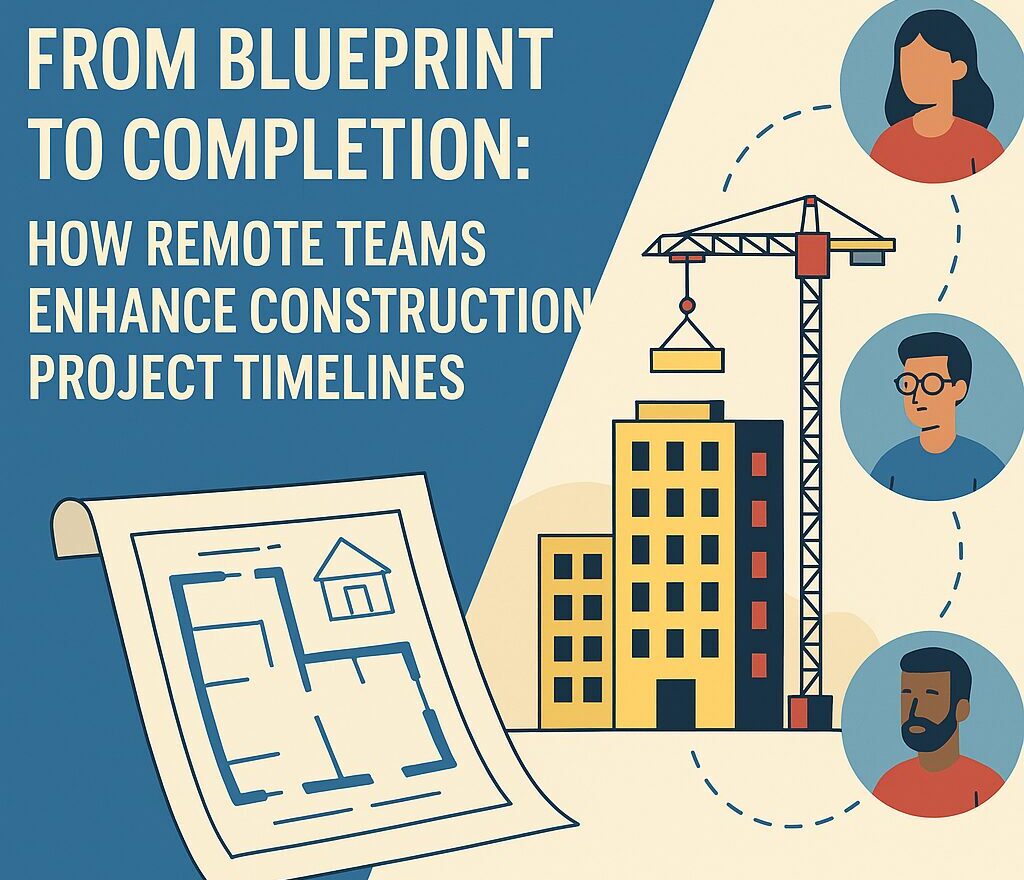Time is money—especially in construction. Every delay, miscommunication, or missed delivery can throw your schedule off and hurt your bottom line. If you’re a contractor or project lead, you know how important it is to keep things moving.
But what if there was a smarter way to manage your time?
Across the country, more and more contractors are discovering the power of remote teams. These professionals don’t have to be on-site to make a big difference. In fact, they can help your construction projects stay on track—and even finish faster.
In this article, we’ll explore how remote teams help speed up timelines from the first drawing to the final inspection.
1. What Is a Remote Team in Construction?
A remote team is a group of skilled professionals who work off-site to support your project. They use software, phone, email, and video tools to stay in touch and get things done.
Some common remote team members include:
- Project managers
- Estimators
- Schedulers
- Procurement coordinators
- Virtual assistants
- Bookkeepers or payroll managers
Even though they’re not on the job site, they play a big role in planning, tracking, and completing your construction projects.
2. Planning Smarter, Starting Faster
The first step in any job is planning. A solid plan saves time down the road. Remote project managers and estimators help make this step smooth and fast.
Here’s how:
- They help create accurate estimates based on real data.
- They build digital project timelines using tools like Trello or Buildertrend.
- They spot potential scheduling conflicts before they happen.
Instead of waiting days or weeks to get all your plans in place, remote team members can help speed up the process. You can start building faster—and with more confidence.
3. Fewer Delays Thanks to Better Scheduling
Delays are one of the biggest headaches in construction. Sometimes it’s weather. Sometimes it’s a delivery problem. But often, it’s poor scheduling.
Remote schedulers help keep everyone and everything on track.
They do things like:
- Set clear dates for each phase of the project.
- Make sure subcontractors know when they’re needed.
- Track material delivery timelines.
- Adjust schedules in real time when changes happen.
Because they’re focused only on managing the flow of the job, they catch problems before they slow you down.
4. Improved Communication = Fewer Mistakes
One of the biggest time-wasters on a job is miscommunication. When crews don’t know what’s happening next—or when clients don’t get updates—mistakes happen.
Remote project coordinators act as your communication hub.
They keep everyone on the same page by:
- Sending out daily or weekly updates to your team.
- Making sure subcontractors know the game plan.
- Answering client questions quickly.
- Organizing and storing important documents (like permits and plans) in one easy-to-access spot.
With remote help managing communication, you get fewer misunderstandings, fewer re-dos, and a smoother workflow.
5. Faster Material Orders = On-Time Jobs
Ever had a job stall because materials didn’t show up on time? It happens more than it should.
A remote procurement coordinator can help with that.
They:
- Order materials early based on the project timeline.
- Track delivery dates and follow up with suppliers.
- Compare prices to make sure you get the best deals.
- Make sure there’s no last-minute scrambling.
When materials arrive when they should, your crew stays busy—and your timeline stays tight.
6. Real-Time Tracking Keeps You on Schedule
One of the best things about using remote teams is their use of digital tools.
They track everything in real time:
- Progress on different parts of the job
- Budget updates
- Change orders
- Timecards and labor hours
That means you always know where your project stands. No guessing. No surprises.
With daily or weekly reports, you can spot problems early and make fast decisions to keep things moving.
7. Focus on Building, Not Paperwork
Many contractors find themselves buried in paperwork—permits, invoices, change orders, crew schedules. All that time spent on admin tasks is time not spent building.
That’s where remote administrative help can make a big difference.
They take care of:
- Filing and organizing digital documents
- Preparing job reports
- Creating invoices
- Tracking expenses
- Scheduling client meetings
When you free up your time, you can focus on managing your crews and delivering top-quality work. That leads to faster completions and happier clients.
8. Scaling Up Without Slowing Down
Want to take on more projects but worried you’ll drop the ball?
Remote teams help you scale your business without sacrificing speed or quality.
You can:
- Run multiple job sites at once
- Add support only when you need it
- Keep overhead costs low
- Deliver projects on time—even as your company grows
This flexibility lets you grow without burning out or delaying jobs.
9. Client Confidence and Repeat Work
Clients love when things go smoothly. When your job finishes on time (or even early), it builds trust and gets people talking.
Remote teams help you deliver that kind of experience.
You’ll look more organized. Your clients will feel more informed. And your reputation will grow—which means more referrals and repeat work.
10. Final Thoughts: It’s Time to Build Better, Faster
Construction doesn’t have to be chaotic. With the right remote team behind you, you can plan smarter, communicate better, and finish jobs faster.
From creating timelines to tracking progress to managing daily tasks, remote professionals keep your project on schedule—without the need for extra office space or staff.
So if you’re ready to go from blueprint to completion with less stress and more success, consider building your next project with remote support.
You’ll save time. You’ll reduce mistakes. And you’ll finish strong.
Need help finding the right remote team for your construction business?
Visit RemotPro.com to see how we help local contractors stay on time, on budget, and on top of every job.





